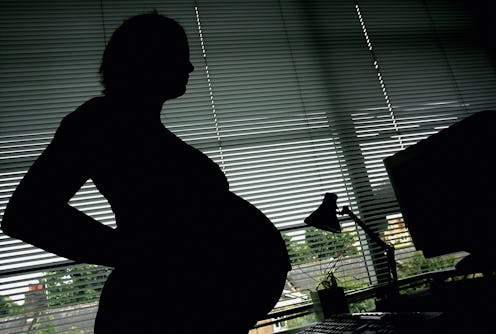News
Study Links Endometriosis To Pregnancy Risks
U.K. researchers have turned up some eye-opening findings on endometriosis, a painful condition of the uterine lining that affects nearly 6.3 million women and girls worldwide. In a new study, which will be discussed this week at the Annual Meeting of the European Society of Human Reproduction and Embryology (ESHRE) in Lisbon, it was found that women with endometriosis have an increased risk of pregnancy complications — specifically, early miscarriage and ectopic pregnancy. And when it comes to women whose pregnancies passed the 24-week mark? According to a press release issued Monday by ESHRE, they were at an even higher than average risk of complications, including hemorrhaging and preterm birth.
Plenty of studies have zeroed in on the link between endometriosis and infertility before — in fact, between 30 and 50 percent of infertile women have endometriosis, according to the American Society of Reproductive Medicine. But until now, not much was known about the impact it might have on pregnancy. So for this study, researchers set out to learn more. In doing so, they dug through the medical records of 14,655 women across Scotland, following up over the span of 30 years between 1981 and 2010. Of those women, 5,375 had endometriosis, compared to 8,280 who did not, but all were pregnant at the same time.
Experts then made adjustments for things like age and whether or not the women had been pregnant before. But no matter which way they sliced and diced it, results still remained the same: women with endometriosis had a significantly higher risk of developing early pregnancy complications. As for the specific stats, those with endometriosis were found to have a 76% higher chance for miscarriage and were nearly three times more likely to experience an ectopic pregnancy. "These results indicate that endometriosis predisposes women to an increased risk of early pregnancy loss and later pregnancy complications," said Dr. Lucky Saraswat, the study's first author, in the press release. (Saraswat is a consultant gynecologist from the Aberdeen Royal Infirmary in the U.K.)
So what does all this mean? Dr. Saraswat thinks it has a lot to do with the pelvis inflammation caused by endometriosis, along with the many changes that happen in the uterine lining when tissue floats around in there where it shouldn't be. "We believe such changes in the pelvic and uterine environment could influence implantation and development of placenta, predisposing them to adverse pregnancy outcomes," she explained.
Okay, so I know what you're thinking right now; all of the above sounds like pretty scary stuff. Especially when you consider that endometriosis affects so many women worldwide. But keep in mind this study is just the beginning, and more research is still needed, with hopefully a larger pool of women. For now, though, study authors just hope that by raising awareness about the possible complications, better medical care and counseling can be put in place for the future. "These new findings suggest that we may need to warn women with endometriosis who become pregnant that they are at higher risk of both early and late complications in pregnancy, and may warrant increased antenatal monitoring," explained Professor Andrew Horne, consultant gynecologist at the MRC Centre for Reproductive Health of the University of Edinburgh and a member of ESHRE's Special Interest Group in the press release. As for what that would look like, it would likely mean more ultrasound scans, and an overall closer eye on early signs of complications like bleeding and other symptoms of preterm labor, which on its own could be huge.
